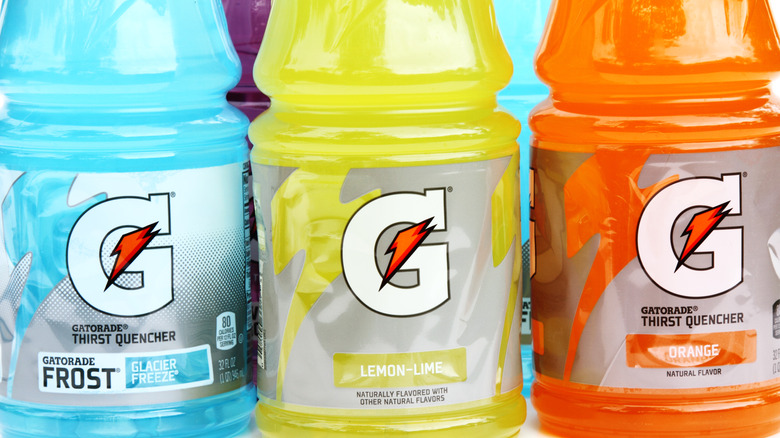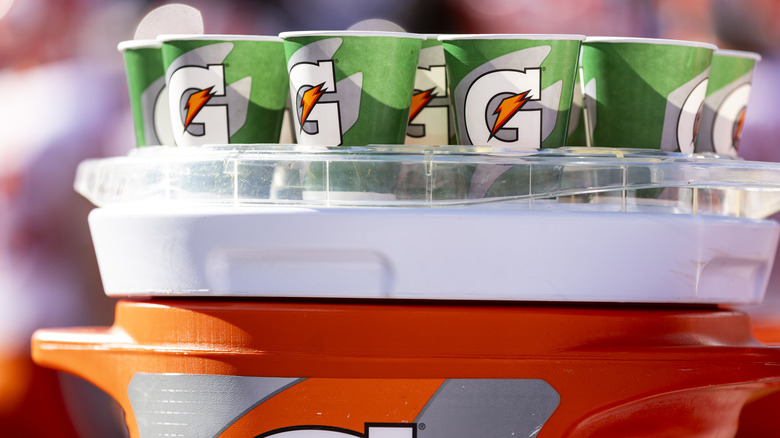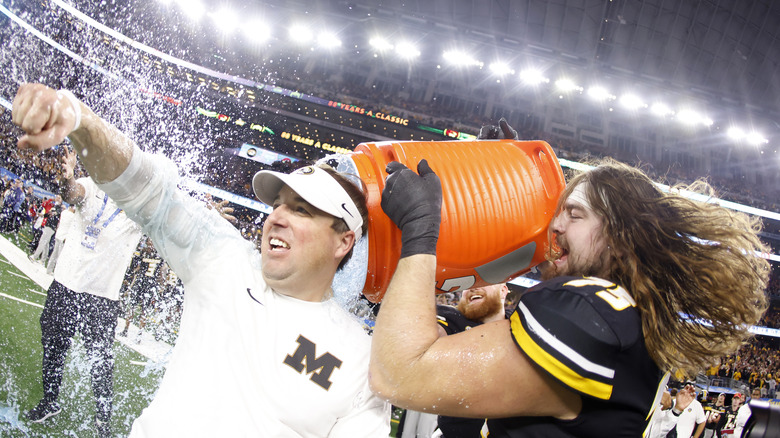How Gatorade Got Its Start In College Football
There are all sorts of sports and energy drinks available now — Powerade, Pedialyte, Monster, Rockstar — but for a long time, there was only one true option on the market: Gatorade. Still the king of the sports drink hill, Gatorade, with its many different flavors, remains the go-to choice for seemingly every professional sports team when it comes to keeping players hydrated and energized. But where did it even come from? What led to the creation of Gatorade? And what about its name?
As it turns out, Gatorade is quite literally named after where it was invented: "Gators" is the mascot of the University of Florida. And unlike many groundbreaking products, Gatorade wasn't created by accident, but through very careful design and experimentation to do exactly what it does now: hydrate overheated athletes. Its story traces back to 1965, and the efforts of assistant coach Dewayne Douglas and kidney disease specialist Dr. Robert Cade.
The University of Florida football team played a pivotal role
If you know one thing about Florida, it's likely that it's hot and humid there — sometimes even exceedingly, sweat-pouringly, blisteringly hot. Overwhelming heat isn't exactly a fun environment in which to play outdoor sports; it can lead to complications like heatstroke and, in extreme cases, death. University of Florida assistant coach Dewayne Douglas, himself a former player, was well aware of the heat's dangers, but was perplexed by one particular question: Why did football players lose so much weight during games — Douglas himself had once lost 18 pounds during a game — but never urinated?
To answer this, he consulted Dr. Robert Cade, the director of renal and electrolytes division at the university. Cade and his colleagues theorized that excessive sweating was causing the players' electrolyte balance to go haywire, and they convinced head coach Ray Graves to let them test some of his players. The results confirmed their hypothesis: The players' chemical balances were severely disrupted. Something had to be done.
Gatorade was a huge success
To solve this issue, Ray Graves and his team set about developing a sports drink to offset what the players were losing. However, they encountered a significant problem: Their first batches tasted horrific, to the point where some players reportedly threw up after drinking it. Their initial attempt was a mixture of water, salt, sugar, potassium, and phosphate — everything a player would need. Dr. Robert Cade's wife suggested adding lemon juice, which made it palatable (though still not particularly tasty).
The summer of 1966 was exceptionally hot, and the Gators universally adopted the drink after a series of heat-related illnesses. The results were remarkable: The team achieved an 8-2 record, and Graves mentioned in interviews that Gatorade deserved much of the credit. From there, Cade and his associates successfully marketed the drink, initially through an Indiana-based company called Stokely-Van Camp, and then through Quaker Oats in 1983 after it acquired the brand.
Gatorade has never looked back or changed its name. Today, there's even a tradition of dousing a winning coach with a bucket of Gatorade during a significant victory.


